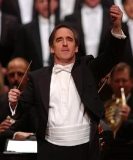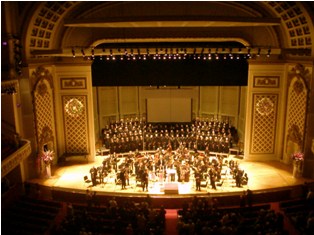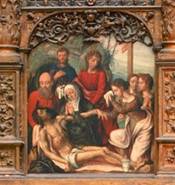
May Festival's "St. Matthew Passion" an Event
Bach’s “St. Matthew Passion” has been performed at the
Cincinnati May Festival eight times in its 137 years. Until 1967, the May Festival was a biennial event,
so that averages to about once every 11 years.
It has been more than twice that long (1985) since Bach’s monumental oratorio was last heard at the May Festival, so Saturday night's performance at Music Hall (May 15) was a true event. It was a multi-media event as well, which made it all the more special. Images of the Passion story, assembled in
collaboration with the Cincinnati Art Museum, were screened above the
stage during the performance.
James Conlon, who is beginning his 31st year as
May Festival music director, conducted the May Festival Chorus, Cincinnati
Boychoir and Cincinnati Symphony Orchestra, with tenor John Aler as the
Evangelist, bass-baritone William McGraw as Jesus and vocal soloist Rebekah
Camm (soprano), Erica Brookhyser (mezzo-soprano), Paul Appleby (tenor) and James
Creswell (bass). The CSO and May
Festival Chorus were divided to form Bach's double orchestra and double chorus.

Each orchestra had two flutes, two oboes, bassoon, 15 strings and portatif organ (played by Heather MacPhail and Michael Chertock). The orchestras were seated side by side on the Music Hall stage. The May Festival Chorus (125 by program count) formed Bach’s double choir and sat adjacent to one another on risers behind the orchestra. Aler was positioned on a riser between the orchestras, with McGraw and the other soloists seated in front of him. The 41-member Boychoir, directed by Christopher Eanes, sang from behind the back row in the left, front balcony.
It was a beautiful sight, with a wreath of flowers on each
side of the proscenium arch framed in a circle of light like a halo. Making it even more beautiful were the
projections. From sixth-century mosaics (from Ravenna,
Italy) to American artist Jack Savitsky’s “Last Supper” (1974), there were pictures to
engage the eye and add another avenue of reflection to the performance. Shown during the chorales – Lutheran hymns originally
intended to be sung by members of the congregation when the Passion was
performed during Holy Week services – were paintings of church interiors from
Bach’s time.

The oratorio -- in effect a sacred opera -- was sung in German with English supertitles. (Unfortunately, for those sitting in the gallery, the tops of the images were cut off by the supertitle board, a problem that should be addressed if similar projects are undertaken at future festivals.) It is a re-telling of Christ’s suffering and death according to St. Matthew, with recitatives, arias, ensembles and choruses. Texts are taken from chapters 26 and 27 of Matthew’s Gospel, sacred poetry by a contemporary of Bach, and Lutheran hymns (chorales). It was three-and-a-half hours of heart-wrenching music, rendered in baroque style, with pointed rhythms, selective string vibrato and finely calibrated textures. Conlon led without a baton.
The low, churning sound of the opening chorus, “Kommt ihr Töchter, helft mir klagen” (“Come ye daughters, share my mourning”), was like dark clouds rolling in. However, they were lined with silver now and then by the Boychoir intoning the chorale melody, “O Lamm Gottes unschuldig”) (“O Lamb of God unspotted”).
Aler, who sang the Evangelist on the last May Festival performance in 1985, was in good voice, though he tired as the evening wore on. Certainly, few tenors could give the role the dramatic force and expression that Aler did, and his voice still has the unmistakable silver edge that has always been its distinguishing quality.
McGraw sang with warmth and nobility throughout, saving a special, keening moment for “Eli, Eli, lama sabachthani?” (“My God, why has Thou forsaken me?”) which, without the halo of strings that elsewhere surrounds Jesus’ words, cut to the heart.
Mezzo Brookhyser had five arias to sing, plus a duet with Camm. Her creamy, dark tone and tight vibrato were ideally targeted to inspire deep feeling in her listeners. She and concertmaster Timothy Lees, who wove plaintive solos on his violin, made “Erbarme dich, mein Gott” (“Have mercy, Lord, on me”) following Peter’s denial of Jesus one of the highlights of the performance.
Bass Creswell was similarly matched to his task with four arias. He shared another of the evening’s stirring moments with violinist Eric Bates, leader of the second orchestra, in “Gebt mir meinen Jesum wieder” (“Give me back my Jesus”), reflecting on Judas’ attempt to return the 30 pieces of silver. Tenor Appleby captured the fathomless pain of Gethsemane in “Ich will bei meinem Jesu wachen” (“I would beside my Lord be watching”), complemented by CSO principal oboist Dwight Parry’s sensitive solos.
Soprano Camm, while possessed of a lovely voice, veered sharp in “Aus Liebe will mein Heiland sterben” (“For love my Saviour now is dying”). CSO principal flutist Randolph Bowman and oboists Parry and Christopher Philpotts (on oboes d’amore) gave added poignancy to the otherwise unaccompanied text.
One of the standouts of the performance was James Lambert on viola da gamba. Lambert is associate principal double bass in the CSO -- that is, when he is not playing gamba with early instrument groups such as Catacoustic Consort. He is a fine, nimble gambist who gave added distinction to Creswell’s “Komm, süsses Kreuz” (“Come, blessed cross”) and Appleby’s “Geduld, Geduld!” (“Rejoice, if ye be reproached”).
The May Festival Chorus, surely one of the most devoted and accomplished volunteer choruses anywhere, were the bedrock of the performance. In their roles as the crowd (a single, stinging shout on “Barrabas!”), commentators on the action and the voices of the congregation in the chorales, they performed with precision and perception, creating the canvas, as it were, upon which the Passion events transpired.
Clearly, the May Festival’s first “St. Matthew Passion” in
25 years made a strong impression on everyone involved, whether listener or
performer. The final chorus, “Wir setzen
uns mit Tränen nieder” (“In
tears of grief, dear Lord, we leave thee”), rang painfully through the hall,
its sadness underscored by the heavy non-harmonic tones Bach applied to the
cadences. When it ended, Conlon stood
motionless on the podium for a long time.
There was hardly a sound in the auditorium before he turned to let the
applause begin.

When it did, it was long, warm and generous. One hopes it will not be a quarter century before this great masterpiece returns to the May Festival.
Final weekend of the 2010 May Festival begins at 8 p.m.
Friday (May 21) at Music Hall with a concert led by Robert Porco. On the program are “Chichester Psalms” by
Leonard Bernstein, “Belshazzar’s Feast” by William Walton and the world
premiere of “Out of the Cradle Endlessly Rocking” commissioned by the May
Festival Chorus in honor of Porco’s 20th anniversary as May Festival
music director. Performing will be the
Cincinnati Symphony Orchestra, May Festival Chorus, members of the Cleveland
Orchestra Chorus, countertenor Paul Flight and baritone Ljubomir Puskaric.
The festival finale is 8 p.m. Saturday (May 22) at Music Hall. Conlon will conduct an all-Russian program consisting of the Rachmaninoff’s one-act opera “Aleko,” the Prologue and Coronation Scene from Mussorgsky’s “Boris Godunov” and Tchaikovsky’s “1812” Overture. Soloists with the CSO and May Festival Chorus will be soprano Kara Shay Thomson, tenor Rodrick Dixon, baritone Ljubomir Puskaric, bass-baritone James Johnson and bass James Creswell. Tickets are $18-$100 at the Music Hall box office, call (513) 381-3300 or order online at www.mayfestival.com